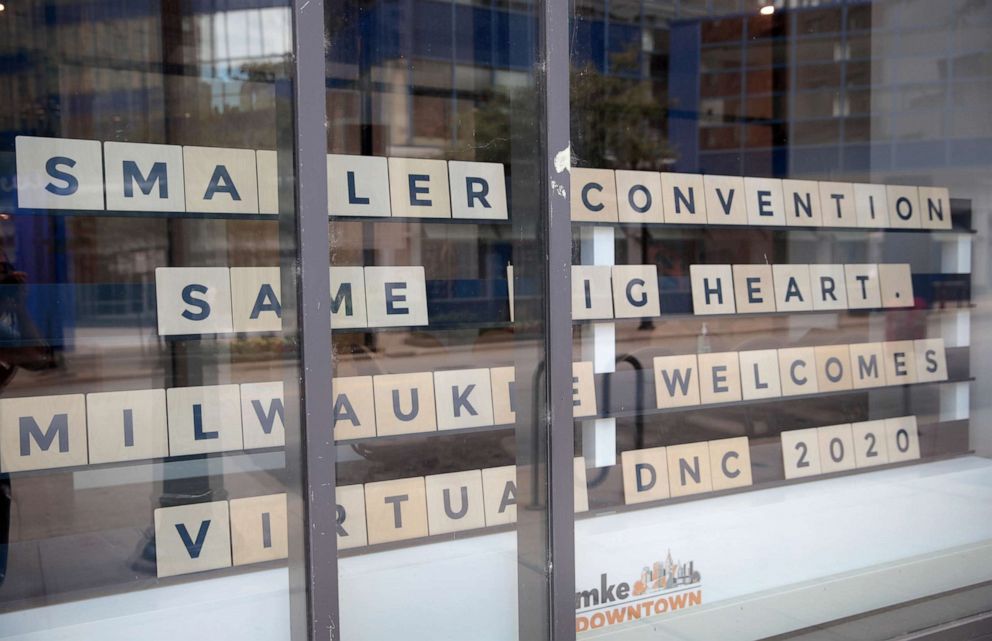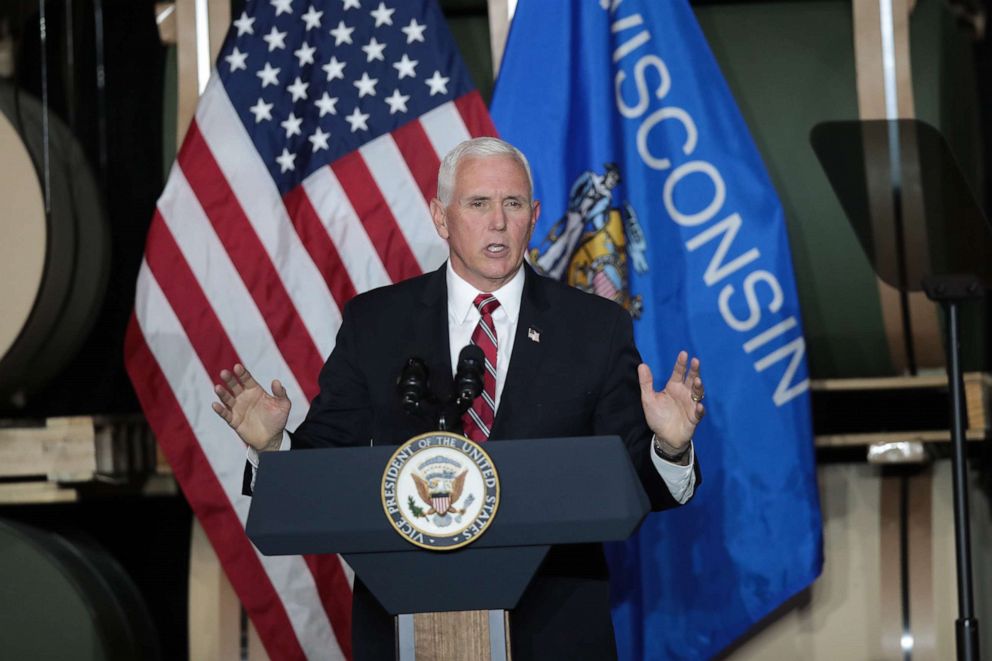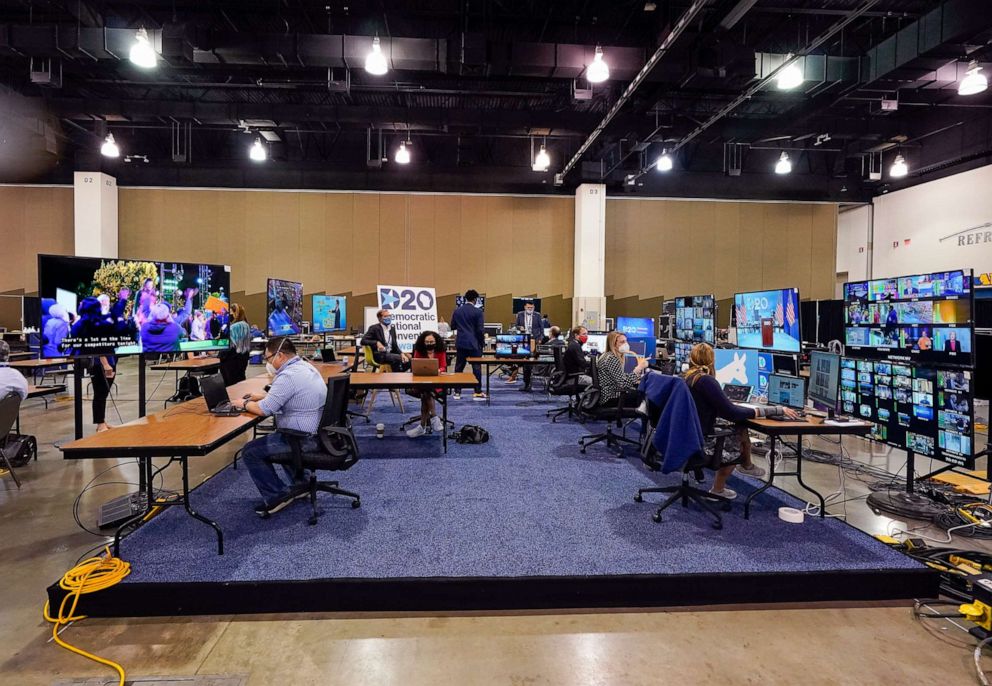Wisconsin Democrats weigh in on Joe Biden's decision to skip in-person visit
Many Wisconsin Democrats say the pandemic is a greater concern.
MILWAUKEE -- Joe Biden made a promise to Wisconsin delegates at the Democratic National Convention on a phone call last week: After deciding not to travel to the state to accept the Democratic presidential nomination because of the coronavirus, he'd be back as soon as possible.
That left Erin Ford, a delegate from Viroqua, Wisconsin, scratching her head.
"If he could have made it, it would have made a difference," she said. "It matters to people that are on the ground."
Besides a trip to Houston to meet with George Floyd's family, Biden has not left the Mid-Atlantic region since the novel coronavirus began spreading in the United States. His few public appearances, including his DNC acceptance speech last week, have been small, socially distant affairs, as his campaign and the Democratic Party work to "follow the science" and campaign cautiously during the pandemic.
While that strategy is giving Ford and other Wisconsin Democrats flashbacks to the 2016 campaign -- when Hillary Clinton did not travel to the state before Election Day -- many expressed confidence in the largely virtual campaign, according to interviews with more than a dozen party officials across the state.
Even as they lamented the loss of a full-scale convention in Milwaukee, Democrats said they were not worried about Biden skipping out on stumping on the ground while the pandemic remains a concern.
"I don't know anybody who is losing sleep about it," Lori Hawkins, the chair of the Kenosha Democratic Party, said of the lack of visits from the Democratic ticket. "We understand that he'll get here, and she'll get here if they can."
Why Democrats feel confident about Wisconsin
Like the Biden campaign, the Wisconsin Democratic Party has also transitioned to an entirely virtual operation, with volunteers using millions of phone calls, emails and text messages to reach voters rather than in-person events and knocking on doors.
"When you ask people what they want, they want this pandemic to be over," Ben Wikler, the chair of the Wisconsin Democratic Party, told ABC News. "This is a way of campaigning that conveys a powerful winning message, and also a commitment to what he's going to do after he's elected."
Democrats point to strong numbers from the state's presidential primary in April, when absentee and in-person voting during the pandemic led to a surprising 163,000-vote victory for a liberal candidate in an important Wisconsin Supreme Court race that was also on the ballot.
"I have never seen the enthusiasm, not even with Hillary, that I'm seeing this year," Marcia Steele, the chair of the Winnebago County Democratic Party, told ABC News.

But in a state where President Donald Trump defeated Hillary Clinton by just 22,000 votes, and three of the last five presidential races have been decided by less than 1%, some Democrats think on-the-ground appearances from either Biden or Harris could make a difference in November.
"If you want to win Wisconsin, you have to earn Wisconsin," Ryan Sorensen, a member of the Sheboygan City Council and a Biden DNC delegate, told ABC News.
"Whether it's visiting an auto plant or coming in and speaking at a dairy farm, I think stuff like that is key," he said. "We've got to do everything we can to turn out support."
Republicans on the ground
Led by the president's campaign, Republicans have returned to in-person, on-the-ground campaigning in Wisconsin and other key states. Trump, Vice President Mike Pence, Eric Trump and the Women For Trump coalition all appeared in Wisconsin last week, in an effort to counter-program the virtual DNC meeting anchored in Milwaukee.
"I heard on the way here that Joe Biden hasn't been to Wisconsin in 659 days," Pence said at an appearance in Darien, Wisconsin.
The campaign also purchased digital billboard space in Milwaukee last week that flashed the message "Where's Joe?" during the convention.
"Their virtual events are really going to be speaking to the choir," Wisconsin Republican Party Chair Andrew Hitt told ABC News. "By not coming here, it is going to be very hard to reach the broader public."
Reid Ribble, a former GOP congressman who was critical of Trump and did not vote for him in 2016, said small, outdoor events in keeping with public heath guidelines could help Biden with independent voters who may still be undecided -- and that doing so would distinguish him from Trump's approach to the coronavirus.
"It wouldn't hurt him to once or twice go after states like Wisconsin, Michigan and Pennsylvania and actually be present," he said. "I think you can do it in a way that's safe."

Some Democrats believe voters appreciate their caution.
Rep. Ron Kind, D-Wis., who represents a district carried by Trump in 2016, and has a competitive reelection race this fall, said his constituents "don't want to see us running for office out there glad handing and kissing babies."
"It's completely tone deaf from the concern that I hear from people that it's real, and we have to be working together to keep people safe. And I think they're cutting Joe Biden some slack in this regard," he said.
Steele, who also works as a nurse at an urgent care facility in Oshkosh, Wisconsin, lamented Trump's visit to the area, and worried that a COVID-19 outbreak would follow.
"Judging by the videos that we saw, I will be swabbing noses in probably 10 to 14 days, which makes me very sad," she said.
Biden leads Trump in a close race
Biden's lack of campaign travel hasn't impacted his standing in the polls in Wisconsin.
He's has been ahead of Trump in Wisconsin throughout the summer, with an Aug. 11 Marquette Law School poll showing him leading the president among likely voters 49% to 44%. (Among registered voters, Biden led Trump 48% to 42%.)
In the same poll of Wisconsin voters, 69% agreed that masks should be worn in public places, while 29% disagreed. And approval of Democratic Gov. Tony Evers' handling of the coronavirus is at 61%, with 35% of respondents disapproving.
"There's a lot of evidence in the Wisconsin data that people here are pretty pro taking cautious action on COVID," said Charles Franklin, the director of the Marquette Law School poll.
"I don't think it's hurt Biden to this point, but I don't know whether it will hurt him later in the fall, whether that contrast becomes a clear example of prudence versus recklessness ... or does it become of timidity and fear versus bold leadership," he said.
Biden's campaign is also diverting more resources to Wisconsin than Clinton did, Democrats and Republicans agree.
Four years ago, Clinton skipped over Wisconsin in favor of travel to states like Pennsylvania and Florida. And her campaign did not run many ads on television in the state ahead of November.

This year, Biden isn't overlooking Wisconsin. His campaign has spent millions on advertising in the state, blanketing all five major media markets with coronavirus spots all summer, and through the week of the DNC. The candidate has also repeatedly sat for interviews with local Wisconsin television stations from his home in Delaware, and local surrogates in Wisconsin have led virtual events in the state.
Earlier this month, more than 3,300 volunteers reached 370,000 voters through text messages and phone calls in a single weekend of action. In Milwaukee, the campaign is also conducting Spanish-language outreach, and organizing Divine Nine phone banks with members of the nine historically Black fraternities and sororities.
"I do think that there's something to be said about taking the time to physically be here, and being able to have socially distant conversations where possible," said Angela Lang, the executive director of the Milwaukee-based BLOC, a progressive group organizing Black voters in Wisconsin.
But compared to 2016, she added, "We're in completely different times."




